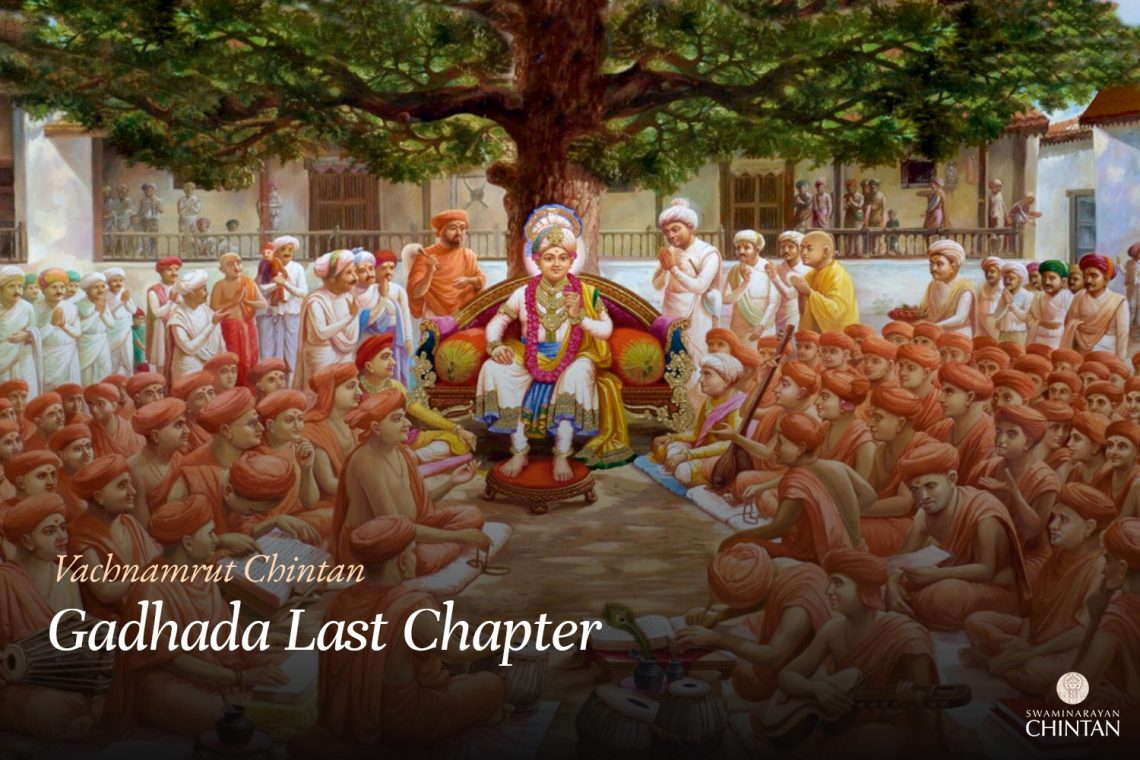Central Insights:
- Striving for the pleasure of Bhagwan and characteristics of a true devotee.
Key Points:
- One should maintain nishkam (desireless) intent in all actions, but the desire to please Bhagwan must be retained.
- Bhagwan becomes pleased when one does what pleases Him and avoids what displeases Him.
Explanation:
This Vachanamrut focuses on desiring and striving for the pleasure of Shreeji Maharaj. Maharaj first states that in acts related to bhakti (devotion), upasana (worship), seva (service), shraddha (faith), and dharmanishtha (adherence to dharma), one should not seek other fruits. As stated in the shastras (holy scriptures), this is correct, but one must at least wish that these actions please Bhagwan. Performing such deeds without this wish is deemed tamoguni (influenced by ignorance). The Gita instructs, मा फलेषु कदाचान — mā phaleṣu kadācana (Do not desire the fruits of actions). Actions performed with nishkam intent free one from bondage, whereas actions performed with desires create bondage. Maharaj elaborates here on what true nishkamta (desirelessness) entails.
Can the ultimate follower of nishkam karmayoga be a laborer who works for an entire day and then refuses wages from the employer, claiming adherence to nishkam karmayoga? Should an employee reject their salary under this principle? Denying compensation in such scenarios seems unreasonable.
Nishkam karmayoga does not imply rejecting wages or compensation. The fruit of any action is of two types. First, iha-laukik (worldly) fruits, which benefit the body in this life but are perishable. Second, paramarthik (spiritual) fruits, which contribute to the soul’s liberation and are eternal. Seeking perishable, worldly benefits constitutes sakamatva (desireful intent), whereas striving for the eternal goal of one’s spiritual welfare does not. Even desiring the pleasure of Bhagwan and His ekantik devotees is not sakamatva but is considered the pinnacle of nishkamta.
The Gita’s concept of nishkam karmayoga ultimately advocates harboring only the wish to please Bhagwan, which is the essence of true nishkamta. Maharaj thus clarifies that while refraining from worldly desires is correct, one must still aspire for Bhagwan’s pleasure. If one does not, and performs actions aimlessly, it constitutes a deficiency in nishkamta, qualifying as tamas or belonging to those seeking only liberation (kaivalyarthi).
The highest form of nishkam bhav is when one performs actions with the ultimate aim of attaining Bhagwan, His pleasure, or the satisfaction of His devotees. Maharaj asserts that such aspirations are necessary. Failing to desire even these, one falls into the category of kaivalyarthi. Worldly desires constitute sakamatva, but the desire for Bhagwan’s pleasure is supreme nishkamta. Performing actions without any intent or purpose (prayojan) is deemed tamasic or the aspiration of a kaivalyarthi.
Furthermore, Bhagwan, being exceedingly generous, is not pleased only by grand offerings. A poor devotee, with shraddha and sincerity, who offers simple items such as water or leaves, also pleases Him. A true devotee is one who does not falter in upasana, bhakti, niyam (vows), dharma, and shraddha, even amidst significant suffering, chronic illness, lack of food, or other hardships. Such a devotee is steadfast and grows stronger in devotion, earning Bhagwan’s utmost pleasure.
Subsequently, Rajbai posed a question through another devotee: “Maharaj, what qualities please you, and what faults displease you?”
Maharaj responded, enumerating the following faults in speech:
- If a person intends to please me with some specific action, they should state their intent once. Repeatedly asking about the same matter displeases me.
- Countering my words with arguments displeases me. Bhagwan’s agnya (commands) are supreme, and thus, questioning them indicates a lack of faith in His divinity.
- Speaking out of turn without being called upon displeases me.
- Shifting responsibility for auspicious actions onto Bhagwan, saying, “If Bhagwan wills, I will do it,” is improper as these actions are within one’s control.
- Exhibiting pride in one’s speech displeases me.
- Speaking without coherence, as if unaware of the proper use of one’s faculties, displeases me.
- Hesitation or lethargy in performing Bhagwan’s bhakti displeases me.
- Pride in one’s virtues, such as bhakti or vairagya, is undesirable.
- Sitting inappropriately in an assembly, either too far back or too far forward, is also displeasing as it reflects vanity.
- Modesty and decorum in women are pleasing. However, gazing around inappropriately during darshan invites Bhagwan’s displeasure.
- Deceit, pride, and anger are utterly disliked.
- Failing to express oneself honestly due to fear of others is also undesirable.
- In satsang, equality among devotees should coexist with mutual respect. A lack of decorum is displeasing.
Maharaj concludes by highlighting behaviors that please or displease Him. To earn Bhagwan’s pleasure, one must abandon what displeases Him and strive to adopt what pleases Him.
Glossary
| Nishkam – Desirelessness A state where one performs actions without seeking personal rewards. |
| Bhakti – Devotion Loving and selfless worship of God. |
| Upasana – Worship and devotion The practice of deep meditation and attachment to Bhagwan. |
| Sakamatva – Desireful intent |
| Ekantik Bhakta – Single-minded devotee A devotee imbued with Dharma, Gyan, Vairagya, and Bhakti, fully dedicated to God. |
| Tamoguni – Influenced by ignorance |
| Kaivalyarthi – Seeker of personal liberation An individual whose sole aim is personal liberation, lacking the desire to please Bhagwan. |
| Agnya – Commands of Bhagwan |
| Prayojan – Purpose |
| Paramarthik – Spiritual fruits |
| Iha-laukik – Worldly fruits Temporary material benefits achieved through actions in this life. |
| Shraddha – Promptness Unwavering belief and readiness to endure challenges for constant remembrance or Seva of Bhagwan. |
| Vairagya – Detachment From Everything Except God |
| Modesty – Humility |
| Tamasic Actions – Ignorance- driven actions |

